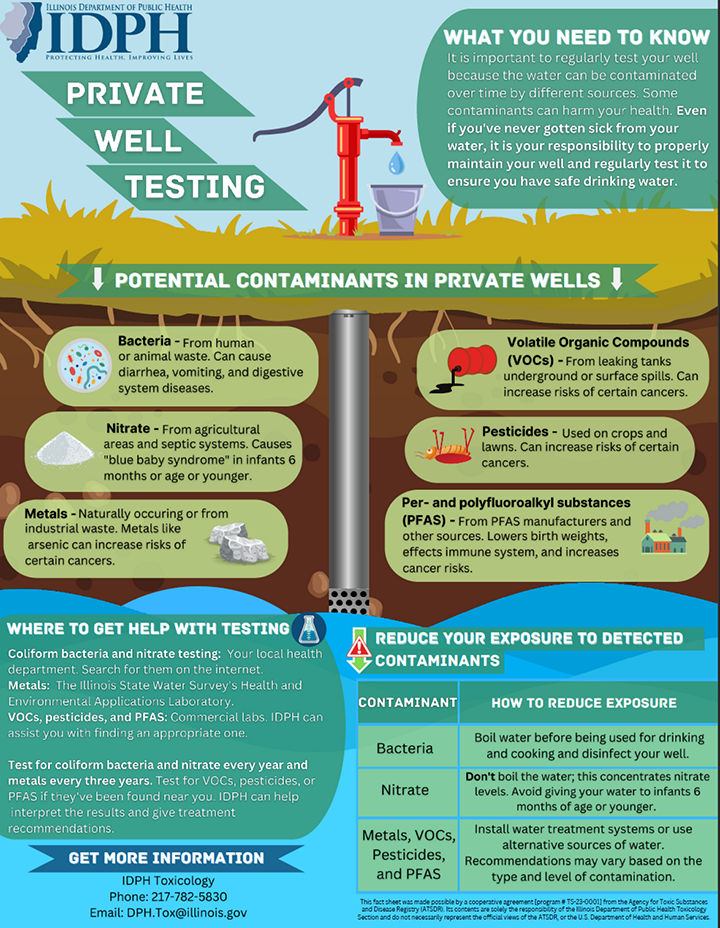The Ultimate Guide To Well Water Testing
Wiki Article
How Well Water Testing can Save You Time, Stress, and Money.
Table of ContentsThe 10-Minute Rule for Well Water TestingMore About Well Water TestingWell Water Testing Fundamentals ExplainedAn Unbiased View of Well Water Testing

Federal government agencies do not monitor or manage water high quality in exclusive wells, and water screening is not required by any kind of federal or state law. If you are among the 1. 7 million Georgians with a private well, you are liable for the high quality and safety and security of your well water.
Appropriately constructed and kept water wells can provide several years of trouble-free solution. Surface impurities may go into the well if it is not properly built and maintained, and the well may at some point weaken or come to be harmed as it gets older. In enhancement, some groundwater naturally consists of one or more chemical compounds at levels over the EPA's health-based requirements, called the Optimum Pollutant Degrees (MCLs)
Evaluate the water when each year for complete coliform microorganisms, nitrates, complete liquified solids and p, H degrees. If you suspect other pollutants, you should test for those. On the other hand, the high quality of water in malfunctioning wells may change instantly and remain unnoticed as the water may look, smell and taste the exact same.
The Only Guide to Well Water Testing
Minimum Screening Recommendations Well, Upkeep Annual All geographical areas Nitrates (Complete Nitrate and Nitrate+Nitrite) Annual Yearly Fundamental Water Chemistry (see below) plus Alkalinity, Soluble Salts (or Total Dissolved Solids), Nitrate, Chloride, Fluoride and Sulfate Originally and afterwards every 3 years p, H, Hardness, Light Weight Aluminum Calcium, Chromium, Copper, Iron, Magnesium, Manganese and Zinc Every year after initialcomprehensive water chemistry Additional Testing Referrals Verification of Possible Contamination A minimum of once and after that yearly follow-up for:1) residences with plumbing that pre dates the 1987 pipes codes with copper piping with lead solders2) older residences in which there are lead pipes3) homes with brass and/or chrome fixtures (brass consists of 3-8% lead; chrome fixtures has lead) All geographicalregions At the very least as soon as and then an annual follow-up Southern Coastal Plain region below the "Loss Line" on the, Georgia map At least as soon as and after that an annual follow-up Piedmont-Blue Ridge regions over the "Fall Line" on the Georgia map Volatile and Semi-volatile Organic Substances, Pesticides, Oil Hydrocarbons and Other Organics Not called for on a regular period; recommended only when contamination is suspected. Well Water Testing.
Examples collected from a kitchen area tap would Web Site mirror the source water residential properties plus any prospective contamination from the well proprietor's water system system. For instance, sampling at the wellhead for lead is not needed, yet sampling from the faucet for lead would certainly show if lead solder was used in the plumbing.

The key MCLs have been evaluated concentrations that provide a vast margin of defense from unsafe wellness impacts for most individuals over a lifetime of drinking. Despite the fact that primary MCLs are enforceable standards for PWSs just, private well proprietors may choose to comply with these standards to shield themselves from the prospective health danger of drinking contaminated water.
The Only Guide for Well Water Testing
The drinking water standard for nitrate is 10 ppm; over this level nitrate can have adverse impacts on human wellness, particularly infants under the age of 6 months. For additional info the MDH has nitrate in drinking water resources online. You may likewise get in touch with the MDH at 800-383-9808. Chemicals are materials made use of to avoid, ruin, push back, or mitigate pests.Cyanazine breaks down in the setting right into various chemicals. Several of the malfunction items of cyanazine have actually been found in Minnesota water. Chemical evaluation in water samples can be expensive and making use of particular chemicals can differ throughout the state making it hard to recognize which chemical to examine.
Based on this, we recommend that you contact the MDA prior to tasting your well for chemicals. The collective or intensifying health and wellness danger connected with low degrees of numerous chemicals in alcohol consumption water is not well comprehended currently. Well Water Testing. In general, vulnerable populaces such as babies, children, and pregnant/nursing women are at best threat
More than 70,000 private wells proprietors will be supplied nitrate screening in over 300 townships.
Indicators on Well Water Testing You Need To Know
The MDH recommends utilizing an approved lab to examine your water. To identify a lab to have your well water examined, go to Minnesota Department of Health And Wellness (MDH) Qualified Environmental Laboratories. The personalized search tab on this page permits you to search for a lab that approves examples from exclusive homeowners.When possible, it is best to eliminate sources of contamination or change an infected water supply with a safer supply Full Report of water instead of rely upon a home water therapy unit. The price to check for chemicals in water might surpass the expense of a point-of-use home treatment system, such as reverse osmosis for drinking water.
If you choose to install a home water therapy unit, the device (or units) you choose should be certified and classified to reduce or remove the substance you are worried concerning. If there is greater than one compound you want removed from your water, you may need to combine numerous therapy procedures into one system.
Report this wiki page